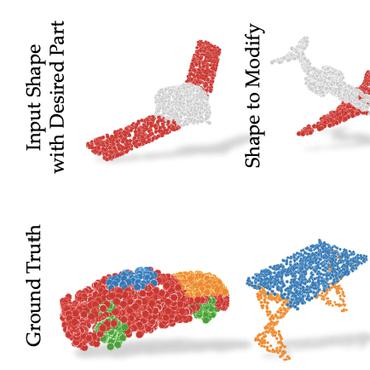Search Results for author: Yue Meng
Found 14 papers, 3 papers with code
Signal Temporal Logic Neural Predictive Control
no code implementations • 10 Sep 2023 • Yue Meng, Chuchu Fan
We conduct experiments on six tasks, where our method with the backup policy outperforms the classical methods (MPC, STL-solver), model-free and model-based RL methods in STL satisfaction rate, especially on tasks with complex STL specifications while being 10X-100X faster than the classical methods.
Hybrid Systems Neural Control with Region-of-Attraction Planner
no code implementations • 18 Mar 2023 • Yue Meng, Chuchu Fan
For each system mode, we first learn an NN Lyapunov function and an NN controller to ensure the states within the region of attraction (RoA) can be stabilized.
ConBaT: Control Barrier Transformer for Safe Policy Learning
no code implementations • 7 Mar 2023 • Yue Meng, Sai Vemprala, Rogerio Bonatti, Chuchu Fan, Ashish Kapoor
In this work, we propose Control Barrier Transformer (ConBaT), an approach that learns safe behaviors from demonstrations in a self-supervised fashion.
Case Studies for Computing Density of Reachable States for Safe Autonomous Motion Planning
no code implementations • 16 Sep 2022 • Yue Meng, Zeng Qiu, Md Tawhid Bin Waez, Chuchu Fan
Recent work provides a data-driven approach to compute the density distribution of autonomous systems' forward reachable states online.
Decentralized Coordinated State Estimation in Integrated Transmission and Distribution Systems
no code implementations • 8 Nov 2021 • Ying Zhang, Yanbo Chen, Jianhui Wang, Yue Meng, Tianqiao Zhao
Current transmission and distribution system states are mostly unobservable to each other, and state estimation is separately conducted in the two systems owing to the differences in network structures and analytical models.
Learning Density Distribution of Reachable States for Autonomous Systems
no code implementations • 14 Sep 2021 • Yue Meng, Dawei Sun, Zeng Qiu, Md Tawhid Bin Waez, Chuchu Fan
State density distribution, in contrast to worst-case reachability, can be leveraged for safety-related problems to better quantify the likelihood of the risk for potentially hazardous situations.
Reactive and Safe Road User Simulations using Neural Barrier Certificates
1 code implementation • 14 Sep 2021 • Yue Meng, Zengyi Qin, Chuchu Fan
Reactive and safe agent modelings are important for nowadays traffic simulator designs and safe planning applications.
Localization and Mapping using Instance-specific Mesh Models
no code implementations • 8 Mar 2021 • Qiaojun Feng, Yue Meng, Mo Shan, Nikolay Atanasov
We show that the errors between projections of the mesh model and the observed keypoints and masks can be differentiated in order to obtain accurate instance-specific object shapes.
VA-RED$^2$: Video Adaptive Redundancy Reduction
no code implementations • ICLR 2021 • Bowen Pan, Rameswar Panda, Camilo Fosco, Chung-Ching Lin, Alex Andonian, Yue Meng, Kate Saenko, Aude Oliva, Rogerio Feris
An inherent property of real-world videos is the high correlation of information across frames which can translate into redundancy in either temporal or spatial feature maps of the models, or both.
AdaFuse: Adaptive Temporal Fusion Network for Efficient Action Recognition
no code implementations • ICLR 2021 • Yue Meng, Rameswar Panda, Chung-Ching Lin, Prasanna Sattigeri, Leonid Karlinsky, Kate Saenko, Aude Oliva, Rogerio Feris
Temporal modelling is the key for efficient video action recognition.
Effects of impulsive harvesting and an evolving domain in a diffusive logistic model
no code implementations • 22 Dec 2020 • Yue Meng, Zhigui Lin, Michael Pedersen
In order to understand how the combination of domain evolution and impulsive harvesting affect the dynamics of a population, we propose a diffusive logistic population model with impulsive harvesting on a periodically evolving domain.
Analysis of PDEs
AR-Net: Adaptive Frame Resolution for Efficient Action Recognition
1 code implementation • ECCV 2020 • Yue Meng, Chung-Ching Lin, Rameswar Panda, Prasanna Sattigeri, Leonid Karlinsky, Aude Oliva, Kate Saenko, Rogerio Feris
Specifically, given a video frame, a policy network is used to decide what input resolution should be used for processing by the action recognition model, with the goal of improving both accuracy and efficiency.
Learning 3D-aware Egocentric Spatial-Temporal Interaction via Graph Convolutional Networks
no code implementations • 20 Sep 2019 • Chengxi Li, Yue Meng, Stanley H. Chan, Yi-Ting Chen
First, we decompose egocentric interactions into ego-thing and ego-stuff interaction, modeled by two GCNs.
SIGNet: Semantic Instance Aided Unsupervised 3D Geometry Perception
2 code implementations • CVPR 2019 • Yue Meng, Yongxi Lu, Aman Raj, Samuel Sunarjo, Rui Guo, Tara Javidi, Gaurav Bansal, Dinesh Bharadia
SIGNet is shown to improve upon the state-of-the-art unsupervised learning for depth prediction by 30% (in squared relative error).
 Ranked #62 on
Monocular Depth Estimation
on KITTI Eigen split
Ranked #62 on
Monocular Depth Estimation
on KITTI Eigen split




